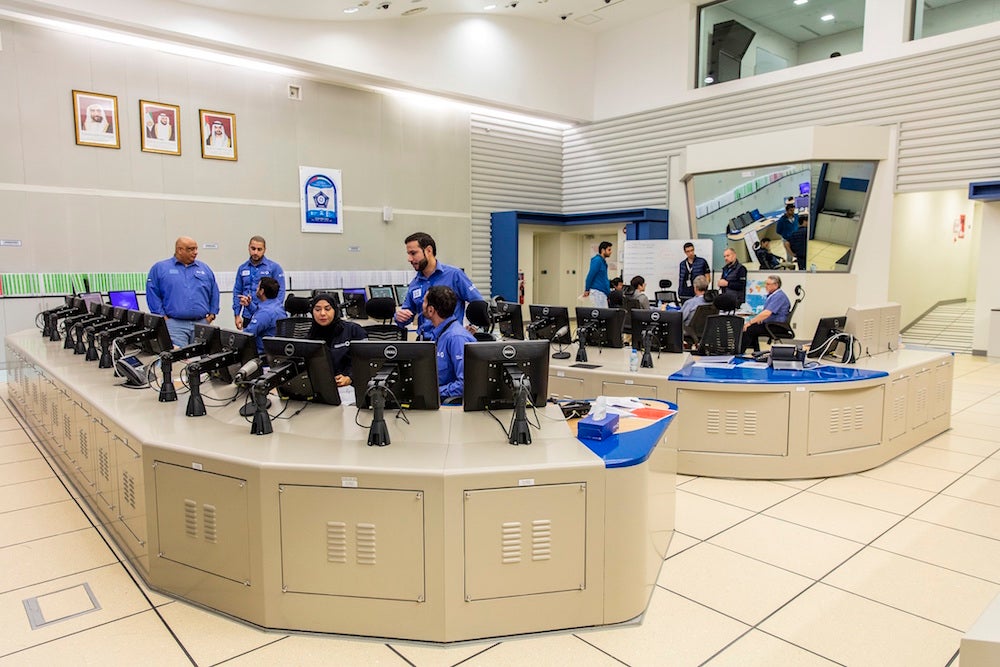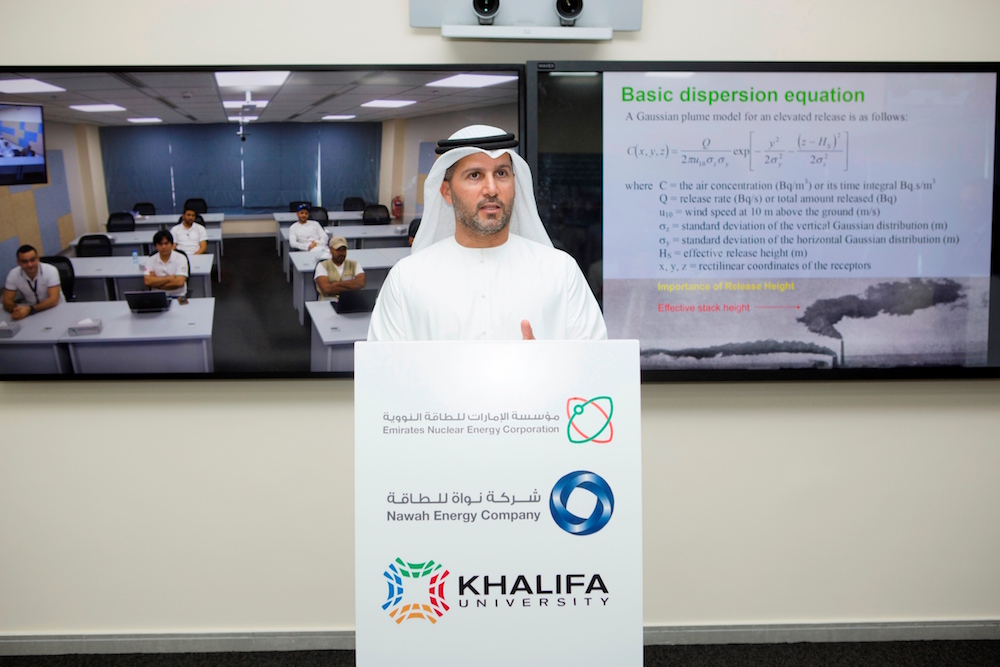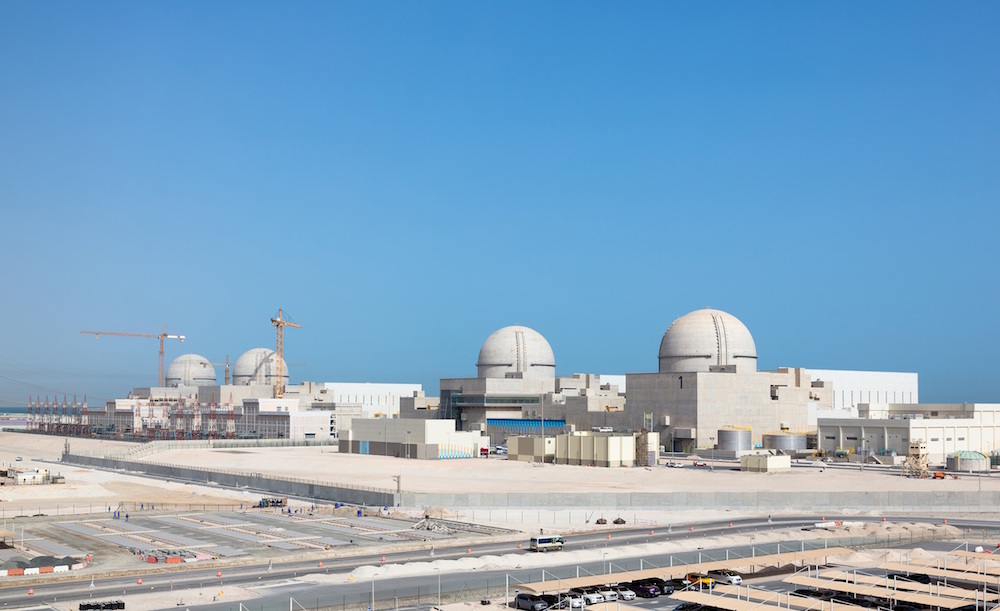
The approaching start-up of the UAE’s first nuclear power plant comes after a decade of investment in developing the country’s nuclear energy workforce.
For Energy Pioneer graduates like Mouza Al Hebsi, stepping inside one of ENEC’s state-of-the-art, full scope APR-1400 training simulators is a rewarding and impressive experience.
ENEC’s simulators are among the most advanced nuclear training devices in the world. They have complex core modelling and ultramodern instrumentation and control (I&C) systems.
A pair of identical full-scope reactor control room simulators that make up ENEC’s Simulator Training Center (STC), at the Barakah plant, where the first unit has been declared ready to start up by an international team.
UAE’s peaceful nuclear energy programme
One of the founding objectives of the UAE Peaceful Nuclear Energy Programme is creating a truly sustainable nuclear energy industry that provides high-value, long-term careers for UAE Nationals.
Since it was established, ENEC has directly supported and contributed to developing a highly skilled and qualified local nuclear energy workforce.
With Nawah Energy Company, which will be responsible for operating and maintaining the Barakah nuclear plant, ENEC offers a wide range of scholarship-based training and development programmes for UAE nationals.
These include undergraduate, postgraduate and vocational courses.
The programmes align with and play a significant role in the progress towards achieving the Abu Dhabi Plan, UAE Vision 2021 and UAE Centennial 2071.
Collectively, these plans aim to transform the UAE’s economy into one that is knowledge-based and sustainable.
That can be achieved by educating UAE national students in science, technology, engineering and mathematics (STEM) subjects and other highly technical fields through a variety of education and training programmes.
Nuclear training for UAE nationals
In 2009, as a part of its wider Energy Pioneers programme, ENEC began offering the Higher Diploma Programme in Nuclear Technology (HDNT), now administered in partnership with Nawah.
The diploma course develops human capacity within the UAE’s growing nuclear energy industry. It also enhances economic cooperation between the UAE, South Korea and other partner nations.
The six-semester programme includes four semesters of theoretical education and training. It is provided by Abu Dhabi Polytechnic and Nawah’s Capacity Building and Training Department.
Students then spend two semesters receiving on-the-job training at facilities in Korea operated by Korea Hydro & Nuclear Power (KHNP).
To date, 350 students have graduated from the Energy Pioneers programme. A further 124 students are in the pipeline to graduate in the near future.
The programme now includes a number of specialised tracks, such as the Nuclear Fuel Design Energy Pioneer Training Programme, and it continues to accept applicants from across the UAE.
Simulators for training the nuclear energy workforce

Alongside the Energy Pioneers Programme, ENEC continues to invest in education and training facilities across the country. It also invests in youth-focused initiatives and platforms.
Investments include the simulator training centre at Barakah, ENEC’s sponsorship of a cutting-edge virtual classroom at Khalifa University and the Barakah Youth Council launched by ENEC and its subsidiaries in 2018.
The Barakah simulator is used in conjunction with classroom and on-the-job training to provide reactor operator and senior reactor operator trainees with the knowledge and skills needed to safely and efficiently operate a nuclear power plant.
Simulation training is part of the essential safety culture of ENEC and Nawah and plays a critical role in ongoing operational readiness preparations.
Meanwhile, the adaptive, effective and secure virtual classroom at Khalifa University enables students and personnel stationed at Barakah to participate in advanced immersive training programmes.
The classroom is equipped with a nuclear engineering simulator. This simulator is used to train a nuclear energy workforce by allowing them to remotely operate virtual equipment and experience real-life scenarios.
Education and vocational training are key enablers of ENEC’s mission and vision to build sustainable careers in the local nuclear energy sector.
Recently, the Federal Nuclear Regulatory Authority (FANR) officially certified 22 UAE national senior reactor operators and reactor operators, who will operate the Barakah nuclear plant.
This is a milestone in the realisation of ENEC and Nawah’s capacity-building and ENEC’s Emirati nuclear energy workforce development programme.
Barakah Youth Council: empowering future Emirati nuclear leaders

While completing their training or starting their careers, young employees at ENEC and its subsidiaries Nawah, and Barakah One Company, have the opportunity to join the Barakah Youth Council (BYC).
The Barakah Youth Council was set up in 2018 to inspire, support, and empower the future Emirati leaders of the UAE peaceful nuclear energy industry.
The BYC serves as a direct channel of communication between the senior leadership of ENEC, Nawah and Barakah One Company and the organisation’s young UAE national employees.
The council provides these young employees with a voice to champion change and drive continuous improvement, while also being involved in the decisionmaking process at each company.
Ali Al Nuaimi, chair of the BYC, said: “Peaceful nuclear energy represents an important part of the UAE’s future. It will provide an incredible amount of baseload power, without producing harmful greenhouse gas emissions.”
“This supports the UAE in achieving its sustainable development goals and meeting its commitments under the Paris Climate Agreement. None of this would be possible without ENEC and Nawah’s capacity building programmes and initiatives such as the Barakah Youth Council.”
Mouza Al Hebsi, who is working as a simulator engineer at Nawah Energy Company, said: “The Energy Pioneers Programme, of which I am a graduate, provided me with the opportunity to contribute to one of the UAE’s most significant national endeavours, the development of Barakah, the Arab world’s first peaceful nuclear energy plant.”
Al Hebsi still remembers visiting the simulator training centre at Barakah nuclear power plant for the first time: “I was surprised and amazed by its size and scope, but now after all my training and time spent at the centre, I really appreciate everything it has to offer and enjoy practising various scenarios.”



